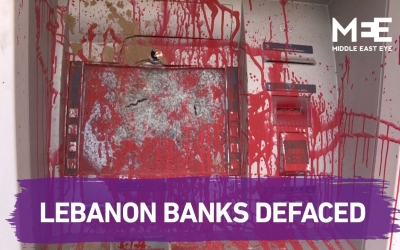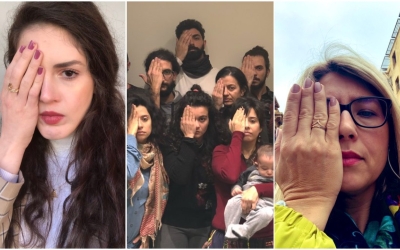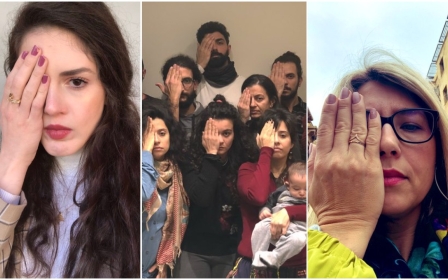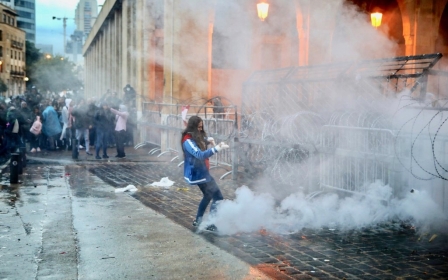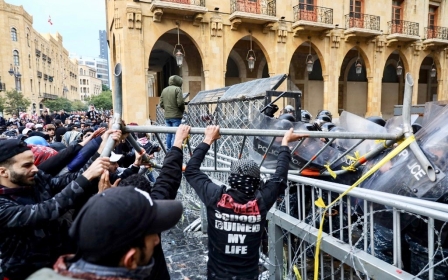'I salute the uprising': Lebanon's PM forms new cabinet after three-month deadlock
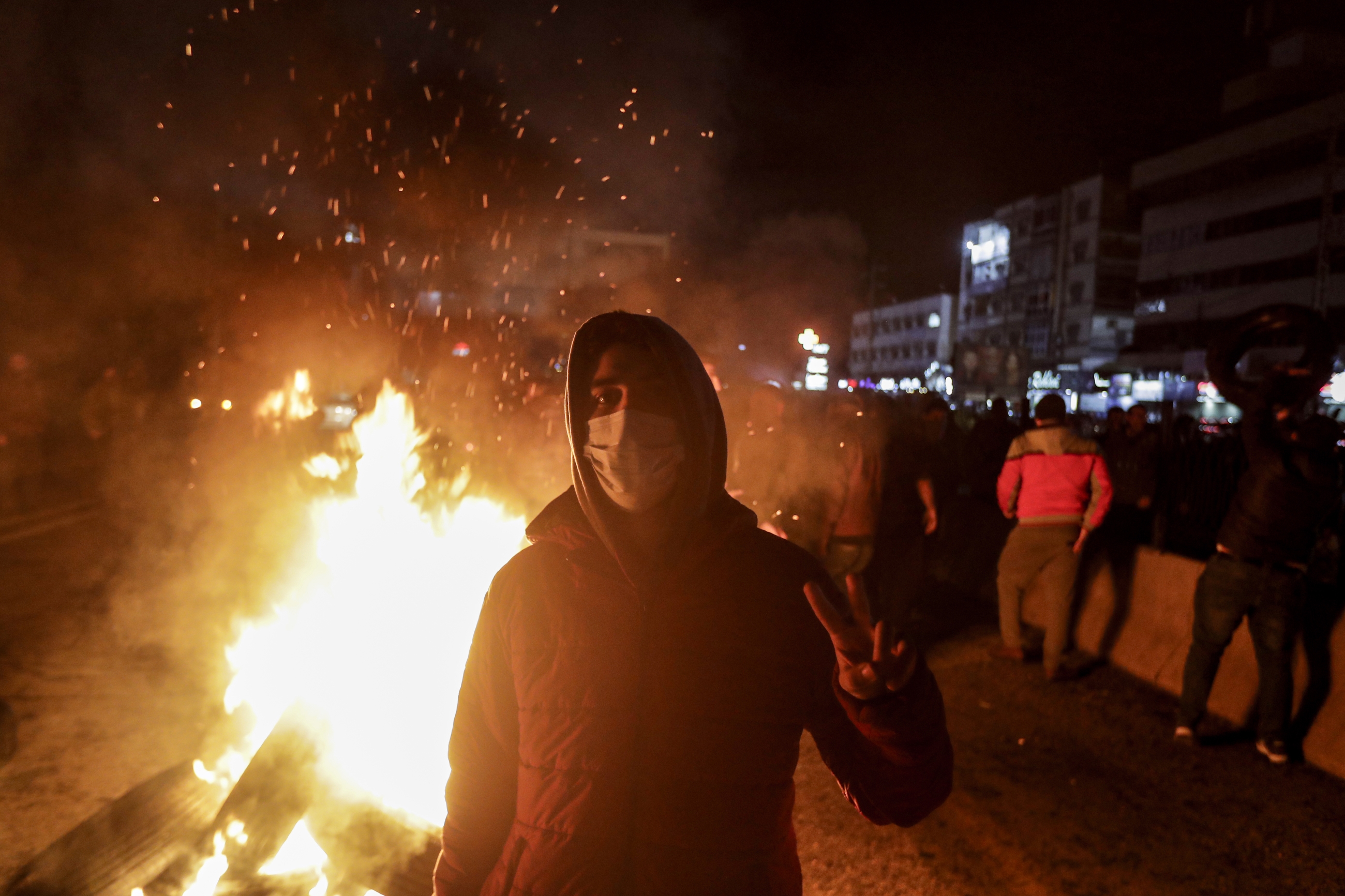
Lebanon formed a new government on Tuesday after almost three months of political deadlock and negotiations with Hezbollah and its allies.
The downsized cabinet of 20 ministers, a third smaller than its predecessor, was announced to the press, following a meeting at the Baabda psidential palace between Prime Minister Hassan Diab, President Michel Aoun and Speaker Nabih Berri.
'I salute the uprising. They united the country and broke the barriers between sects and regions,'
- Prime Minister Hassan Diab
"I salute the uprising," Diab said, referring to the ongoing anti-corruption protests. "They united the country and broke the barriers between sects and regions."
He promised to push for the demands of the protesters for an independent judiciary, to combat corruption, to end regressive taxes on the poor, and to solve the country’s rampant unemployment.
New MEE newsletter: Jerusalem Dispatch
Sign up to get the latest insights and analysis on Israel-Palestine, alongside Turkey Unpacked and other MEE newsletters
Some ministries were merged together, including Agriculture and Culture, and Social Affairs and Tourism, and some small-scale state ministries were axed altogether.
The new cabinet includes six women, including Deputy Prime Minister and Defence Minister Zeina Akar, the first woman to take on the role.
Cabinet has 'personality, work, management'
Diab commended the new cabinet, which is set to have its first meeting on Wednesday, saying it consists of experts and technocrats.
Among the ministers with the largest burden is Finance Minister Ghazi Wazni, a former advisor to parliament's finance and budget committee, as well as Energy Minister Raymond Ghajar, a long time advisor to the ministry.
However, some cabinet appointments have raised eyebrows, including Ramzi Mcharffieh, an orthopedic surgeon, who now heads the newly merged Social Affairs and Tourism Ministry.
Diab dismissed concerns about some ministers being unqualified, when asked by the press.
"There is personality, work, management," Diab said. "Therefore, the topic of expertise applies in many ways."
Diab's key backers are the Free Patriotic Movement, Amal and Hezbollah. Their political rivals - notably the Future Movement led by former premiere Saad Hariri, Christian Lebanese Forces and the Druze-led Progressive Socialist Party - have opted out from participating in Diab’s government.
Diab’s appointment came following intense political consultations between parliamentary blocs and President Aoun, where he won the vote of 69 of Lebanon’s 128 MPs.
Opponents mostly voted for diplomat and International Court of Justice judge Nawaf Salam, who said he was subject to a defamation campaign by Hezbollah and its allies due to his close ties with the United States.
Roads remain blocked around the country
Different protest groups have gathered in Tripoli and downtown Beirut in the wake of the new government's formation. Social media and WhatsApp messages have circulated calling for countrywide general strikes.
Roads were blocked in Baddawi, Minnieh and Dinnieh in the north, Taalabaya in the Bekaa, and in several locations in and around Beirut. Protestors are calling for more road closures and a renewed general strike.
Most protests since the onset of the uprising have called for an independent technocratic government that helps Lebanon out of its economic mire and paves the way for early elections.
Political paralysis ensued among Lebanon’s ruling parties following the countrywide uprising that started on 17 October over the country’s nose-diving economy, which led to the resignation of Hariri’s cabinet 12 days later.
Several leading candidates to succeed Hariri were brought to the table, only to withdraw following public pressure and political bickering among party leaders, including Hariri himself.
Others were billionaire and former finance minister Mohammad Safadi, and contractor Samir Khatib; who withdrew following the Sunni Dar al-Fatwa's endorsement of Hariri; and 91-year-old former minister of justice, Bahij Tabbara.
'Deep concern'
Lebanon has one of the world's highest debt-to-GDP ratios, no economic growth, and rampant economic inequality and corruption.
It is struggling to maintain the value of its US dollar-pegged local currency due to a shortage of greenbacks, as banks continue to restrict the withdrawal of dollars. Meanwhile, currency exchange offices are applying increasingly inflated black market exchange rates, effectively devaluing the Lebanese pound.
The international community, notably the United Nations-led International Support Group (ISG) one has called for political stability and unity, economic reform, while also allowing protestors to gather peacefully.
The group includes the UK, US, Russia, China, France, as well as European and Arab states, threw its weight on the Hariri-led government in their early days of the uprising.
In a statement released earlier on Tuesday, the ISG expressed "deep concern" over the lack of a "functioning government" to tackle the country's worsening economic crisis. It warned that the Lebanese population would face "more hardships", "more security risks and instability", should delays continue in the formation of "an effective and credible government."
Protests in the capital over the past week have turned more violent, as socioeconomic conditions continue to worsen, including surges in daily power outages. More than 300 demonstrators were wounded in one night alone.
Middle East Eye delivers independent and unrivalled coverage and analysis of the Middle East, North Africa and beyond. To learn more about republishing this content and the associated fees, please fill out this form. More about MEE can be found here.


